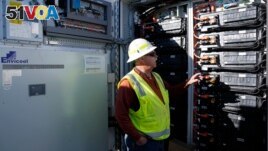U.S. electricity providers are quickly adding batteries to store electricity in large amounts.
The batteries are mainly ones called lithium-ion batteries.
Increasingly, companies are using these batteries with solar and wind projects. The agencies that run electric grids, utility companies and developers of renewable energy say combining technologies is necessary to use renewable energy in the future.

FILE - Mike Vandrely, construction manager, checks on a battery storage pod at Orsted's Eleven Mile Solar Center lithium-ion battery storage energy facility Thursday, Feb. 29, 2024, in Coolidge, Ariz. (AP Photo/Ross D. Franklin)
Batteries to store electricity
In the Arizona desert, a Danish company is building a large solar farm that includes batteries that charge when the sun is shining. The batteries are able to supply energy back to the electric grid when it is not.
Some people think combining batteries with green energy will result in a better climate. "Green energy" is a term used to describe ways of creating power that do not appear to cause pollution.
"Solar farms only produce when the sun shines, and the turbines only produce when the wind blows," said Ørsted chief Mads Nipper. "For us to maximize the availability of the green power, 24-7, we have to store some of it too."
Some people think batteries will permit renewables to replace fossil fuels like oil, gas and coal. Batteries can help keep a steady flow of electricity when there is no wind or sun to produce it. For example, when people are sleeping at night and using less electricity, the energy produced from wind can be stored in batteries. Then, the stored energy can be used when demand is high during the day.
Juan Mendez of Tempe, Arizona, gets power from local utility Salt River Project (SRP), which is working with Ørsted on the Eleven Mile Solar Center. As a state senator, Mendez pushed SRP to move to renewable energy.
Mendez thinks the power company is still investing too much in gas and coal plants. A major project is planned for a natural gas plant in Coolidge, Arizona, near the solar center.
"This solar-plus-storage is a good step, but SRP needs to do more to provide clean energy and clean up our air and help address climate change," Mendez said.
SPR said it is adding more renewable forms of electricity production. The company's board of directors recently promised to add no new carbon to the atmosphere, or to have "zero emissions," by 2050.
U.S. efforts to expand batteries
The United States is second in electrical storage in the world after China. In 2023, the U.S. added an estimated 7.5 gigawatts of electrical storage capacity. A report from BloombergNEF and the Business Council for Sustainable Energy said that is 62 percent more than in 2022. That amount of electricity could power 750,000 homes for one day. The total amount of electricity storage capacity in the U.S. is enough for 2 million homes for one day, BloombergNEF estimates.
California has the most energy storage in the country. It has twice as much as any other state. Residential, commercial and utility-level battery capacity increased by 757 percent there over four years. The California Energy Commission said there is now enough electrical storage capacity to power 6.6 million homes for up to four hours.
Texas has the second-most battery storage after California. Last month, Schneider Electric announced it is working with energy company ENGIE North America on solar and battery systems in Texas. The aim is to get closer to the French multinational's 100 percent renewable energy goal in the U.S. and Canada.
Hans Royal is Schneider Electric's senior director for renewable energy and carbon advisory. He said the deal with ENGIE, and the necessary $80 million investment, would not have been possible without the passage of the Inflation Reduction Act. That was a major climate-related law passed by the U.S. Congress in 2022.
Royal is advising other big companies he works with to get into the market for electricity storage.
"The industry needs that, the grid needs it," said Royal.
The future
Back in Arizona, Ørsted's Eleven Mile Solar Center has 857,000 solar panels and more than 2,000 cubes that look like large shipping containers but contain batteries. Ørsted also has large solar and storage projects in Texas and Alabama, and in Europe.
When the Arizona facility opens this summer, most power from the solar farm will go to Facebook owner Meta's data center in the town of Mesa. Any extra solar power, in addition to the power stored in the batteries, will go to the local utility's customers. The new batteries can ensure power to about 65,000 homes for a few hours of high demand.
"What I think is exciting is just how rapidly this market is moving," said Yayoi Sekine, head of energy storage at BloombergNEF.
I'm John Russell.
Jennifer McDermott reported on this story for the Associated Press. John Russell adapted it for VOA Learning English.
_______________________________________________
Words in This Story
battery – n. a device that stores and supplies electricity
grid – n. a network that supplies electricity to a large area
utility – n. a service such as a supply of electricity that is provided to the public
charge –v. to add more electricity into a batter
24-7 (twenty-four seven) –adv. taking place all the time
turbine – n. an engine that has a part with blades that are caused to spin by wind or air
residential –adj. for use in homes and private citizens
commercial –adj. related to businesses
capacity – n. the amount of something that can be produced or supplied
